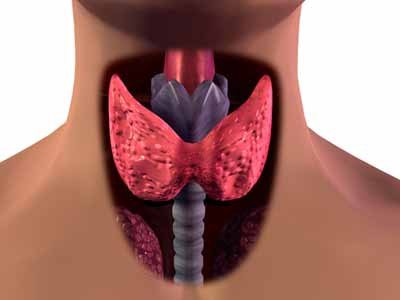The human body is a harmonious system in which all processes are regulated among themselves. And each body in its composition contributes to the maintenance of holistic work.
Along with the brain, one of the most important regulatory mechanisms is the human endocrine system. It carries out its action through the
endocrine glands, which secrete hormones that have certain functions and tropism to specific target cells. So, the thyroid gland plays an important role in the development of the body, affects all types of metabolism. It secretes thyroid hormones, which contribute to the physical, mental development in children, provide
metabolism and energy in adults. In turn, their production is regulated by the nervous system, namely the biologically active substances of the pituitary gland and the releasing factors of the hypothalamus. Thus, thyroid hormones are always at a certain level in the blood and increase with the special needs of the body, their decrease may indicate a lack of thyroid function or iodine.
Hormones
Glandula thyroidea (thyroid gland) is attached to the trachea and consists of the right and left lobes connecting the isthmus. The direct synthesis of thyroid hormones is carried out in its follicles, filled inside with a colloid, the basis of which is a protein - thyroglobulin. With further iodination of tyrosine amino acid residues in its structure and the subsequent summation of the obtained compounds, triiodothyronine and tetraiodothyronine are formed (T3 and T4). Further, the obtained thyroid hormones are cleaved from the thyroglobulin molecule and enter the bloodstream in free form. They have different concentrations, and also vary in strength of action (T3 is released significantly in lower doses, but its strength is much greater than that of T4). However, hormones have the same effect on the body: they increase fat and carbohydrate metabolism (increase glucose), start gluconeogenesis, inhibit glycogen formation in the liver and increase protein synthesis (in excess, on the contrary, increase the breakdown of the latter).

Outwardly, this is manifested by the fact that they maintain blood pressure and heart rate, as well as body temperature, accelerate mental and emotional processes. In the embryonic period, thyroid hormones are responsible for the differentiation of tissues of the whole organism. In childhood, they contribute to the growth and mental development of the child. In addition, they enhance erythropoiesis, lower tubular reabsorption of water.
Diseases
With some
diseases of the thyroid gland, the release of hormones decreases (hypothyroidism). In this case, they must be replaced with medicines. What can compensate for the lack of content of elements such as thyroid hormones? The drugs used in this case are Levothyroxine (T4), Lyiotironin (T3) and various iodine-containing medicines. Both a deficiency and an excess of thyroid hormones lead to metabolic diseases in the body, which are clinically manifested by a violation of homeostasis and psychomotor activity. The degree of damage depends on the age of the patient (cretinism only in children), the level of deficiency or excess of hormones (hyperthyroidism 1, 2, 3 degrees). With the latter, shortness of breath, palpitations, increased blood pressure, a violation of all types of metabolism are observed. With a deficiency, on the contrary, the metabolism is reduced, the patient becomes lethargic, indifferent.